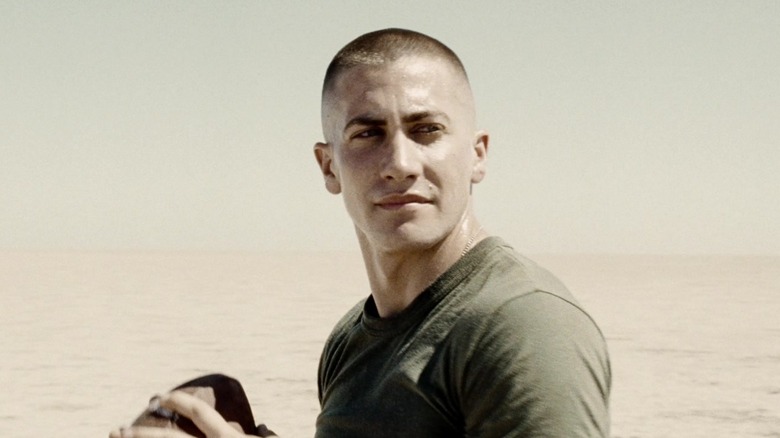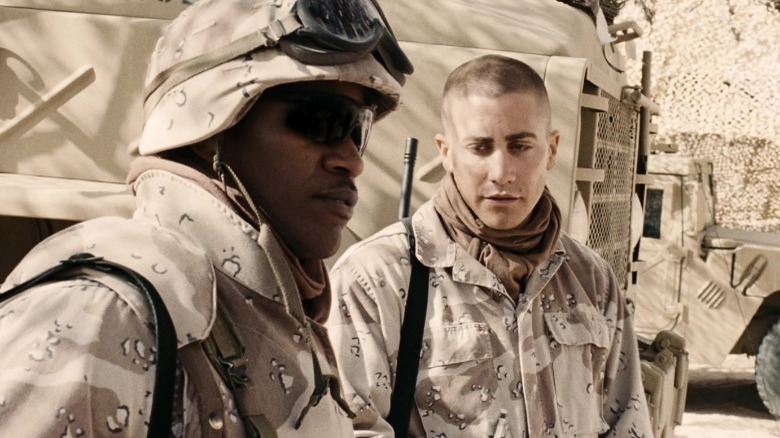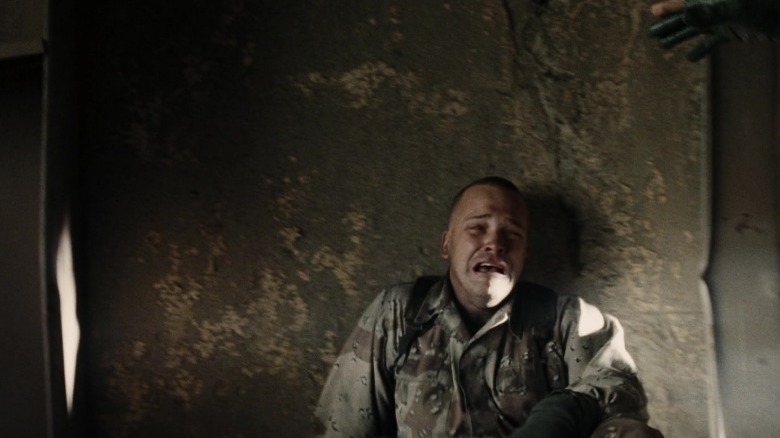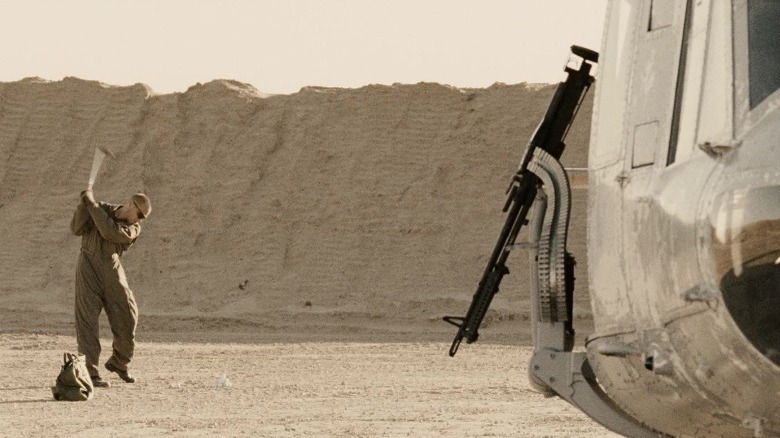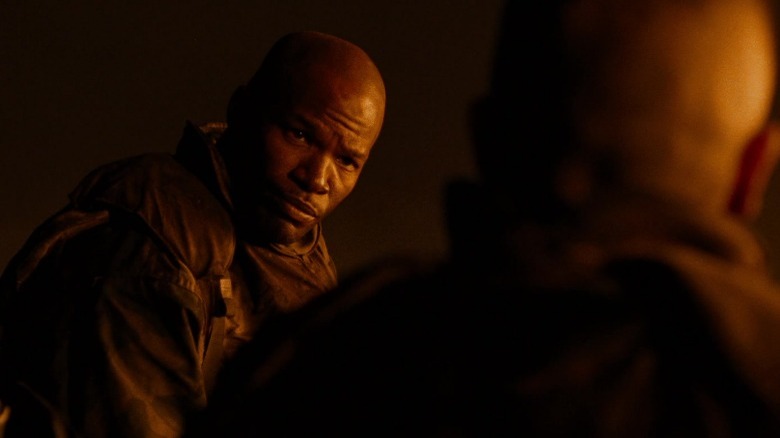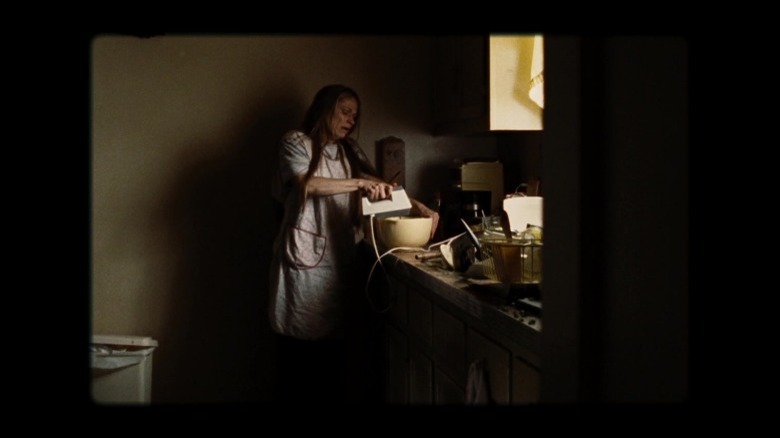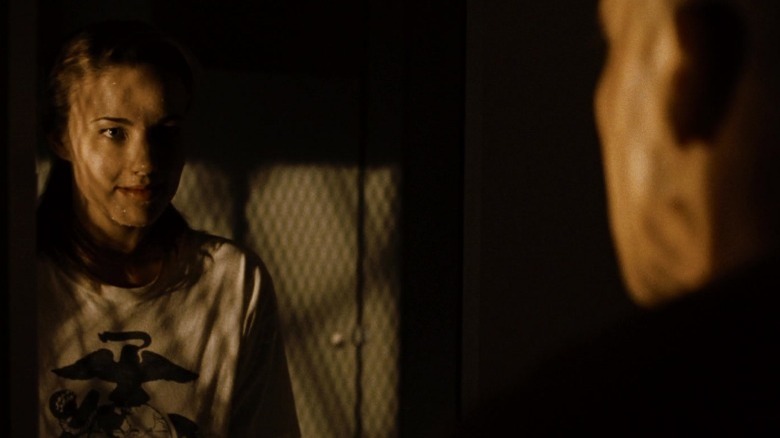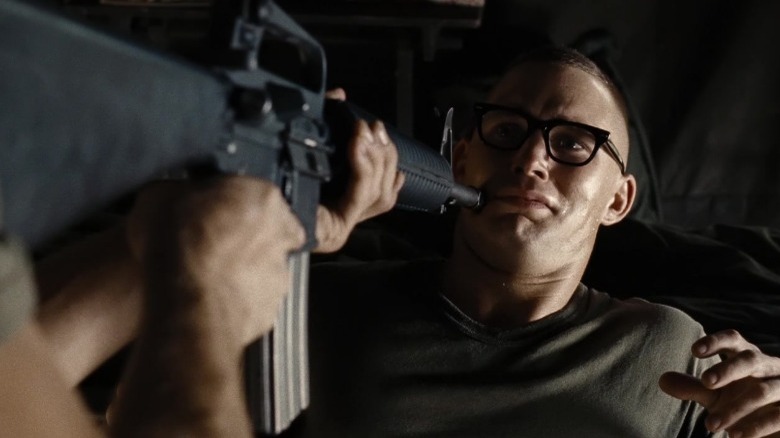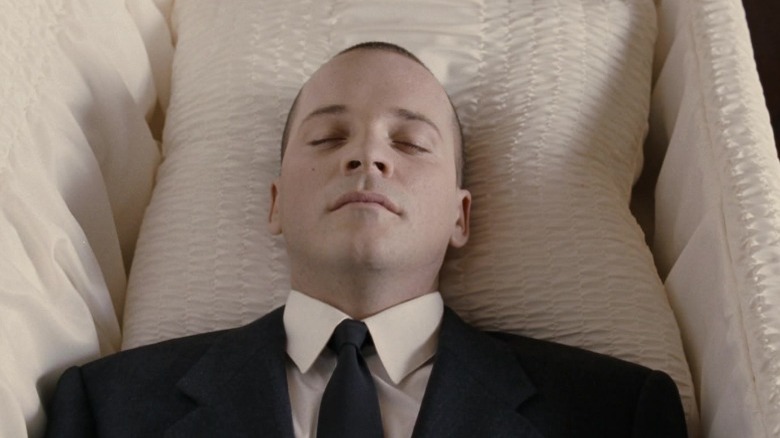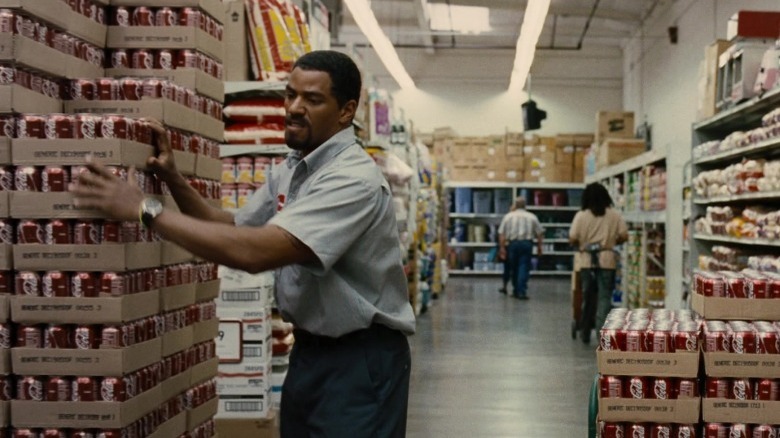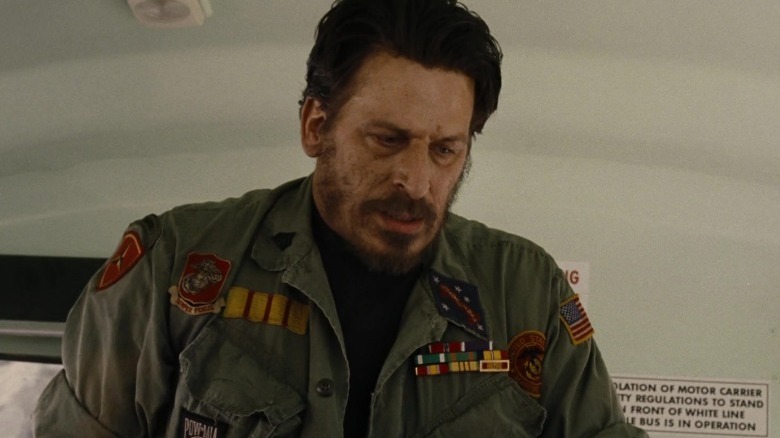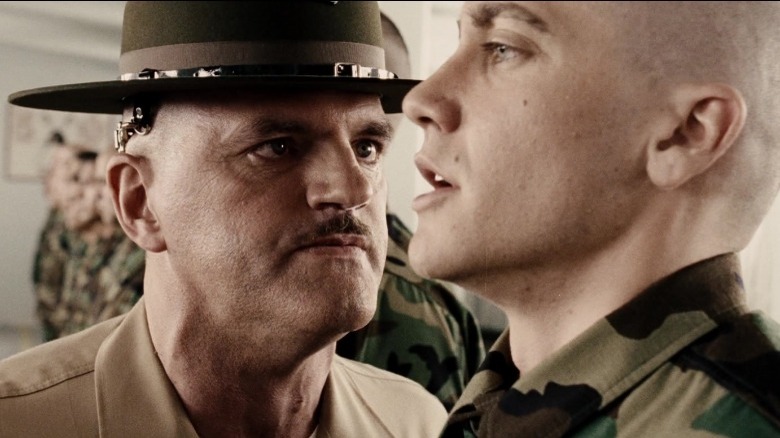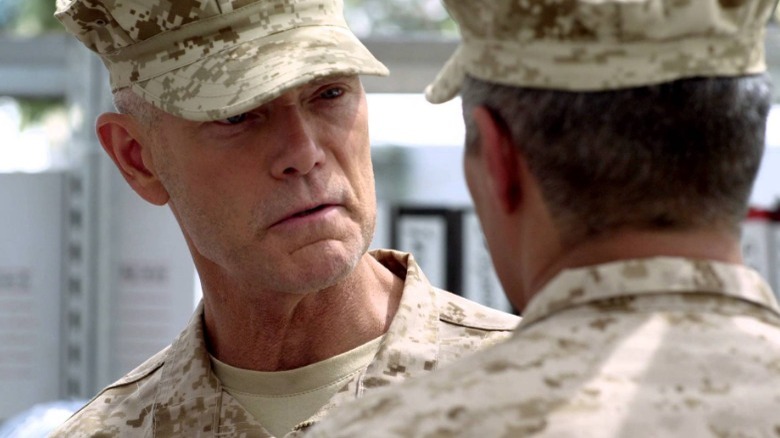The Ending Of Jarhead Explained
Moviegoers who watch "Jarhead" expecting a traditional war movie will probably end up scratching their heads. "Where's the action?" they may ask. "Where's the heroism?" There is nothing particularly heroic about the Marines in "Jarhead," who make lewd remarks and fight amongst themselves. At a glance, nothing much seems to happen in this film. The characters spend most of the movie waiting around, and in fact they never really experience an actual battle. The only deaths shown onscreen are that of a recruit who dies in a tragic and easily-avoidable accident at the training camp, as well as a few background characters who are killed in friendly fire.
From its offbeat opening to its anti-climactic ending, "Jarhead" breaks almost every rule of the genre. Yet, for precisely this reason, this underrated war movie may be more realistic and accurate than most other films from the genre. It is, after all, based on a true story.
Still, viewers will undoubtedly have questions after watching the film. You may wonder why Swoff (Jake Gyllenhaal) refuses to share his backstory with the audience, or why he almost kills his friend. And why does a scene near the end of "Jarhead" place the spotlight on a random Vietnam veteran who was never even mentioned in the rest of the movie? We assure you that there are explanations for all these questions and more, if you take a closer look at the ending of "Jarhead."
What you need to remember about the plot of Jarhead
The movie "Jarhead" is based on a memoir called "Jarhead: A Marine's Chronicle of the Gulf War and Other Battles," in which author Anthony "Swoff" Swofford shares his experiences serving in the Gulf War. The movie stars a fictionalized version of Swoff.
Swoff starts out as a sensitive student who reads Albert Camus, but his military service hardens him. For Swoff, the Marines prove to be a toxic work environment; Staff Sergeant Sykes (Jamie Foxx) publicly humiliates him by ordering him to play the bugle (even though he has no bugle), a drill sergeant slams his head against a chalkboard, and his fellow Marines practice a hazing ritual where they tie him to the bed. In spite of this, Swoff still wants to be accepted as one of the guys. Like his fellow soldiers, Swoff wants to be branded with the initials of the United States Marine Corps, an honor that his bunkmate Troy (Peter Sarsgaard) tells him is only bestowed upon those who earn it.
Swoff participates in Operation Desert Shield, which basically involves waiting around in the Saudi Arabian desert preparing for a possible war. Soon the restless Marines are plagued by boredom and stung by the knowledge that many of their girlfriends back home have decided to leave them. Swoff and his pals are desperate for an actual fight — so much, in fact, that Swoff comes dangerously close to shooting his friend Fergus (Brian Geraghty) during an argument.
What happened at the end of Jarhead?
More than an hour into the movie, the war finally begins. Even then, however, the Marines must wait at the border while the U.S. military launches an air raid. Once Swoff and his colleagues are authorized to go into battle, they find the war is not quite what they expected. The only Iraqis they encounter are the burned-up bodies of civilians who were trying to flee the war. The closest they ever get to a real fight is an incident of friendly fire.
For a moment, Swoff and Troy think their fantasy about becoming war heroes will come true. Their talent as snipers lands them a special assignment to kill two men in an Iraqi airfield. Yet before Troy gets to pull the trigger, Major Lincoln (Dennis Haybert) orders Troy to hold his fire. The base is about to be destroyed by a U.S. air strike anyway, and killing the men in the tower would only alert the Iraqis to the attack. Convinced the kill is rightfully his, Troy becomes so outraged that Swoff needs to restrain him.
The Gulf War ends shortly thereafter, before Swoff or Troy get the chance to fire a single shot. Instead, they shoot at the sky while the other Marines rejoice, but neither man feels like celebrating. Troy kills himself soon after he returns home. Meanwhile, Swoff regrets ever joining the Marines, though he knows that he cannot escape that part of his identity because the war has changed him forever.
If you or anyone you know is having suicidal thoughts, please call the National Suicide Prevention Lifeline by dialing 988 or by calling 1-800-273-TALK (8255).
Why do the Marines spend so long waiting?
There are two answers to this question, one historical and one artistic.
The most obvious reason why the soldiers are waiting is that the war hasn't technically started yet. Although Iraq had invaded Kuwait in August 1990, the United Nations spent months negotiating with Iraq. Meanwhile, the U.S. began amassing forces in Saudi Arabia, preparing just in case there was war. It was only after Hussein refused to pull out of Kuwait by the U.N.'s deadline that Swoff and his fellow Marines were officially authorized to enter combat, thus launching Operation Desert Storm in January 1991.
But that doesn't necessarily explain why the movie spends so much time on the Marines waiting around. Surely it could have skipped over much of the waiting and jumped ahead to the moment when the characters are sent into battle, right? This may be true, but that's not the kind of movie that Sam Mendes wanted to make. The director wanted to make a non-traditional war movie, because he knew that real war doesn't actually look like it does in the movies. "Jarhead" is supposed to be set in the real world, where Marines need to clean the latrines and soldiers can get killed by friendly fire simply because they forget to walk in formation. In an interview with NPR, Mendes explained that he was trying to explore "what happens if you train a man to go to war and then you take away the war."
Why are the characters in Jarhead so desperate for a fight?
As demonstrated by the charred bodies that Swoff discovers, war is not fun. So why are these men so eager to plunge into combat? Part of it is simply the frustration of waiting. Plus the war movies that the characters watch make war seem glamorous to them. "Apocalypse Now" may have a strong anti-war message and be one of the best Vietnam War movies of all time, but it also happens to make combat look cool. "The magic brutality of [war films] celebrates the terrible and despicable beauty of their fighting skills," wrote Anthony Swofford in his book (via The New York Times).
What's more, "Jarhead" suggests that these characters get an almost sexual gratification from war. They refer to going into combat as "getting some," a term normally only used to describe having sex. As well, Lieutenant Colonel Kazinski (Chris Cooper) tells the Marines that their war cries turn him on. For these men, who feel powerless as their girlfriends back home leave them one by one, combat is a way for them to scratch that itch and feel like they are actually in control of their lives. Anthony Swofford observed to The East Bay Times, "We happened to be at war in a place where there were no outlets, such as alcohol and women, as there were in Vietnam," adding, "There's an ingrained psychological link between sex and death, and we were at the forefront of death."
Why won't Swoff talk about his backstory?
Swoff hints that he has a troubled family history, but he quite literally shuts viewers out of his personal life. After giving us brief glimpses of Swoff's parents in bed and Swoff's sister in a hospital, the movie cheekily slams a door in the audience's face. There is an entire story that we are not privy to.
Why does the movie tease these fascinating backstory moments, only to yank them away from us and never mention them again? Most likely, these moments allude to events from Swoff's life that were explored in the book but were omitted in the movie in the interest of time. The real-life Swofford had so much to unpack in his relationship with his abusive father that he filled another whole book with that material, a memoir titled "Hotels, Hospitals, and Jails." Perhaps Sam Mendes wanted to briefly acknowledge these moments, or was simply trying to express how soldiers often lock away their emotions because they can't afford to think about their problems at home.
Equally telling are the memories Swoff chooses to share — most of which involve his girlfriend Kristina (Brianne Davis). These anecdotes make sense for a macho yet insecure Marine. Swoff may be reluctant to discuss his problems at home, but he is happy to share his sexual exploits, if only to reassure himself that Kristina will still be waiting for him when he returns.
If you or someone you know is dealing with domestic abuse, you can call the National Domestic Violence Hotline at 1−800−799−7233. You can also find more information, resources, and support at their website.
What does Swoff's nightmare mean?
In a surreal dream sequence, Swoff looks in the mirror and sees his girlfriend, still wearing the T-shirt he lent her. This signifies that he can't stop thinking about her and worrying that she might not be faithful to him. Naturally, she haunts his nightmares. If you're looking for a more symbolic interpretation, you could read this to mean the glimmer of femininity in Swoff that he believes is making him "soft." Ever since he signed up for the Marines clutching a Camus book, Swoff has been tormented for showing any sensitivity. So Swoff trains harder and parties harder, trying to prove he is "one of the guys." Even though the Marines later accept Swoff as one of their own, Swoff is still clearly insecure. His nightmare is simply revealing his worst fear.
Even stranger, however, is the ending of Swoff's nightmare, in which he vomits up a torrent of sand. What gives? Well, after trekking through the desert for so long, Swoff must have sand in his shoes, under his nails, and all over his body. It only follows that the sand is inside him, too; the desert has become a part of him. Even after his military service has ended, he will still think like a soldier, and he will still carry that trauma with him. Swoff and his fellow Marines may be home, he observes in the final scene, but they are "still in the desert."
Why does Swoff almost kill Fergus – and what makes him stop?
Halfway through the movie, Swoff loses his temper and threatens to shoot his buddy Fergus. At a glance, it seems like Swoff snaps for a rather petty reason: he blames Fergus for causing a fire that only happened because Swoff asked Fergus to cover his watch. However, there is much more going on here.
For one, Swoff is unleashing his pent-up frustration after months of training to fight in a war that seems like it will never happen. There are no enemies for him to fight, so instead he turns on his friends. As for why he picks on Fergus in particular, it's probably because when Swoff looks at Fergus, he is reminded too much of himself. Fergus is the most sensitive of the Marines. Swoff can't help but see himself in Fergus — or at least his younger self, who was humiliated for being "too soft" when he first joined the Marines; Swoff wants to bury that version of himself forever.
Thankfully, Swoff cannot bring himself to kill Fergus. He has been itching for a chance to kill, but when somebody's life is actually in his hands, he is suddenly not so trigger-happy. Instead, he dares Fergus to kill him instead. "Do you f***ing see how hard it is?" he cries. Taking a life, he discovers, is not easy. Besides, even though Swoff predicts he would get off relatively lightly for Fergus' murder, he knows that this kill would not make him a hero.
Why does Troy kill himself?
In the movie's climax, Major Lincoln orders an air strike on the target that was originally assigned to Troy. Feeling robbed of a kill, Troy begs Lincoln to at least let him get in one shot. When the major refuses, Troy flips out. He ought to be glad that his home country is achieving such a swift victory, but instead all he cares about is whether or not he plays a role in that victory.
This shot is so important to Troy because he knows this will be his only chance to become a war hero. Troy's superiors have found out that he concealed his criminal record when he enlisted, so they've denied him the opportunity to re-enlist. After Operation Desert Storm ends, Troy will go home, so he is desperate to make the most of his final mission.
Knowing that Troy will soon be sent home, his friends give him the much-coveted "brand." Ordinarily this would be a great honor, but the gesture seems hollow to Troy because he knows they are only doing it to make him feel better. "You want a brand, you gotta earn it," says Troy earlier in the movie, and in his eyes, he hasn't earned it. Since Troy is self-conscious about his criminal record, he clearly believes that becoming a Marine is the only way to redeem himself. When that fails, Troy feels he has nothing left to live for, which is why he ultimately kills himself.
If you or anyone you know is having suicidal thoughts, please call the National Suicide Prevention Lifeline by dialing 988 or by calling 1-800-273-TALK (8255).
Why do the Marines come home feeling empty?
It should come as no surprise that Swoff and the other Marines feel hollow when they return home. Nobody comes home from a war with a brighter outlook on life. Yet "Jarhead" shows how even a war lasting only a few months can leave a huge impact on soldiers. Each of the characters feels empty for different reasons. Troy feels unsatisfied because he saw the war as his only chance to do something meaningful with his life, and he blew it. Meanwhile, Swoff is disappointed because he spent the whole movie desperate to get a piece of the action, yet once he finally sees the war up close, he wonders why he was in such a hurry to fight. Kruger (Lucas Black) finds himself in a boardroom, while Ramon (Laz Alonso) ends up working at a convenience store; both men seem to find these jobs meaningless compared to their military service.
Perhaps the ending is best summed up by a remark that Troy makes earlier in the movie. When asked what happens once you reach the final level of a video game called Metroid, Troy gives a decidedly anti-climactic answer: "Nothing. You just start all over again." There's no reward at the end, no sense of satisfaction from having accomplished anything. It just ends, without any fanfare. This could easily describe any war, and especially the Gulf War. These characters come home and wonder, "What was the point of it all?"
What's with the Vietnam veteran on the bus?
For a minor character who never appeared before, the Vietnam veteran (Vincent Foster) who climbs aboard the bus and welcomes the boys home at the end of the movie gets an awful lot of attention. The camera focuses on him as he is suddenly struck by a wave of either relief or exhaustion; he says, "You mind if I sit down on your bus?" What does this mean, exactly? Is he overtaken by awe at what these Marines have accomplished? Is he disappointed that he wasn't out there with them? Does he feel like he can finally relax now that they're home safe?
Luckily, the director can offer some insight. Sam Mendes told NPR that he meant for this character to illustrate a strange paradox about war. The man is a Vietnam vet who has seen the horrors of war yet still sends a younger generation out to fight in another conflict. "That to me is the most frightening thing," said Mendes. "That, you know, you can see and do see men whose lives have been destroyed by it who still are thrilled that they did it."
This veteran is proud of these Marines, but he almost wishes he had been in combat with them. He also feels let off the hook, because he no longer needs to feel guilty about sending these men off to their deaths.
Is Jarhead an anti-war movie?
Many viewers may wonder what tone Sam Mendes was trying to strike in "Jarhead." Does the movie glorify war or condemn it? "Jarhead" certainly shows the ugly consequences of war, and Swoff regrets joining the Marines, yet Swoff is still disappointed that he didn't get to shoot anybody. Sometimes it can be hard to tell if you're supposed to love Swoff, hate him, or pity him.
The real-life Anthony Swofford revealed a bit more about his intent in writing "Jarhead" to The East Bay Times, saying, "The fact is that most guys who are there fighting and killing, they're not pro-war. They want to kill people, but ... they don't necessarily want to see people suffer. There's a difference. 'Pro-war' and 'anti-war' are convenient tags here in the States, but they're not very important to the guys on the ground with the rifles."
Mendes was also equivocal, saying that "Jarhead" could be seen as pro-war or anti-war, depending on who you asked. "It depends on the eye of the beholder," he told Cinema Confidential (via The World Socialist Web Site). "I'd like to see it as a great hymn to the resilience and bravery of the Marines, in the face of nothingness." Most likely, Mendes was less concerned with the morality of war and more interested in understanding why men like Swoff wanted so badly to fight (even if they wanted to fight for the wrong reasons).
Why do the Jarhead sequels have nothing to do with the original?
You may not know that "Jarhead" grew into a franchise with three low-budget sequels: "Jarhead 2: Field of Fire," "Jarhead 3: The Siege," and "Jarhead: Law of Return." Of course, you would be forgiven for not noticing, since each of the sequels has nothing in common with the original except their titles. There are no returning directors or writers, and (aside from a cameo for Major Lincoln in "Jarhead 3: The Siege") no returning cast members; in fact, the sequels are a totally different genre from "Jarhead."
How did it even end up with sequels? The ending of "Jarhead" doesn't exactly scream "sequel," and the film certainly wasn't a financial success. Enter Universal 1440 Entertainment, a branch of Universal Pictures that specializes in creating low-budget films that skip theaters and go straight to home release. The division primarily produces sequels to theatrical releases, because franchises are easier to sell than original titles. They hunt for IPs with a fan base that seems like they would be willing to purchase a straight-to-DVD sequel. It turned out that "Jarhead" was popular enough to warrant not just one sequel but three, which fans of military action movies gobbled up.
We can't help but wonder if we'll start seeing straight-to-DVD sequels to other war movies, including the other one directed by Sam Mendes. If you're sifting through a DVD bargain bin, don't be surprised if you find a movie called "1917: Guns Blazing."
